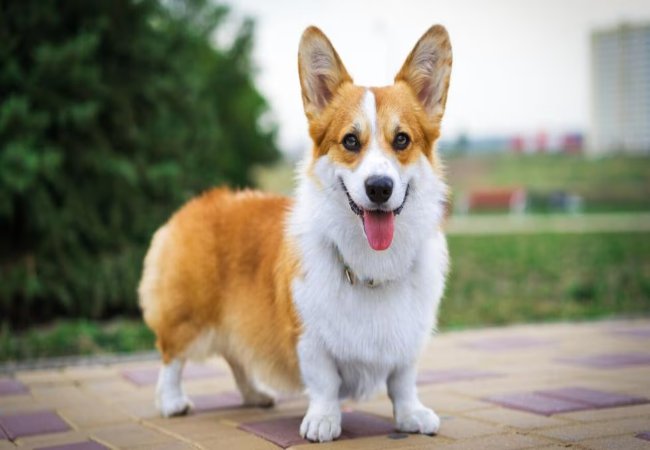Pembroke Welsh Corgi Guide 2025: Temperament, Care, Health & Training 🐶

In this article
Pembroke Welsh Corgi Guide 2025: Temperament, Care, Health & Training 🐶
By Dr. Duncan Houston BVSc
Introduction
The Pembroke Welsh Corgi is a small, charismatic herding dog known for its fearless spirit, big bark, and affectionate nature. Ranked 11th in canine intelligence, this breed shines in homes that offer structure, mental stimulation, and consistent training.
History & Origins 🏰
Originating in Pembrokeshire, Wales, around the early 12th century, Corgis were developed by Flemish settlers for herding cattle and sheep. Their dwarf stature—"cor" meaning dwarf and "ci" dog in Welsh—allowed them to nip at heels and avoid kicks. They arrived in the U.S. in the 1930s, gaining rapid popularity thanks to their intelligence and royal favor.
Queen Elizabeth II famously owned more than 30 Pembroke Corgis during her reign, cementing the breed’s cultural icon status.
Breed Characteristics & Appearance
- Size: 10–12 inches tall; 22–30 lb adults.
- Coat: Medium‑length double coat; sheds year—peak in spring/fall.
- Color: Red, sable, fawn, black & tan — with or without white markings.
- Tail: Normally naturally short or docked; docking is banned in many countries.
- Head: Fox‑like with alert, erect ears.
Temperament & Behavior
Pembrokes are intelligent, affectionate, and alert—often described as a “big dog in a small body”. While eager to please, they have a stubborn streak, making consistent, positive training essential.
As herding dogs, they may nip at heels or bark—especially with children—so early socialization is key.
“Herding children sounds like a plus, … Herding means nipping ankles at playing children.”
Exercise & Activity Needs 🚀
Although small, Corgis are energetic and agile. They require at least 1 hour of daily exercise—including walks, playtime, or herding activities. Off‑leash play in a fenced yard is ideal.
Agility, obedience, tracking, and herding are excellent outlets and enrichments for their intelligence.
Coat Care & Grooming ✂️
- Brushing: At least twice weekly; daily during shedding seasons to reduce loose hair.
- Bathing: Every 6–8 weeks, or as needed—coat repels dirt, baths should be minimal.
- Nails, ears & teeth: Trim nails weekly, clean ears monthly, brush teeth 2–3× per week to reduce dental disease.
- Skin/allergy watch: Corgis may develop skin issues—monitor for itching, redness & consider vet‑approved topical care.
Nutrition & Weight Management
Corgis love to eat and gain weight easily. A measured, balanced diet with age‑appropriate kcal intake—typically ~150–300 g/day depending on life stage—is vital.
Monitor weight monthly and adjust based on body condition. Obesity stresses joints and worsens health risks like diabetes and back issues.
Health Screening & Common Risks
Average lifespan: ~13 years—US Kennel Club: 12–13; UK 2024 study: 13.2 years.
🔍 Key Health Concerns
- Degenerative Myelopathy (DM): Spinal disease from ~7 yrs; DNA tests for SOD1 mutation are recommended.
- Hip Dysplasia: Less common but screened via hip‑score programmes.
- Von Willebrand’s Disease: Genetic bleeding disorder; test breeding stock.
- Eye Issues: Progressive retinal atrophy, cataracts more common in older dogs.
- Obesity‑linked Back & Joint Problems: Intervertebral disc disease risk elevated; healthy weight reduces strain.
- Infectious Diseases: Vaccinate for parvo, distemper, rabies, leptospirosis, Lyme, etc..
Work with breeders who perform genetic health tests and annual vet checks, including dental exams and joint evaluations.
Training Tips & Socialization
Start training at 8 weeks with short, fun sessions. Use positive reinforcement and reward-based methods—essential for intelligent but independent Corgis. Early socialization with children, animals, and environments helps reduce nipping & anxiety. Herding games like “find and herd” with soft toys help satisfy instincts.
Living Environments & Compatibility
Corgis adapt well to apartments if exercise needs are met. Ideal homes include young families with active routines, fenced yards, or multi-pet environments. Avoid fraternity-like homes without monitoring, as boredom leads to mischief (e.g., digging, barking).
Not suitable for: very elderly people without mobility support, households with very young toddlers (nip risk), or homes unwilling to offer at least 1 hr daily fitness & mental engagement.
Breed Comparisons: Pembroke vs Cardigan
While both are loyal herders, Cardigans are larger, heavier-set, with long tails and rounded ears. Pembrokes are slightly more outgoing, suit active homes, and are the more popular U.S. choice.
Why Veterinarians Love Them ❤️
Corgis excel in preventive care compliance: they respond to training and are eager to learn medical routines. Their low stature makes conducting exams & procedures less stressful for the dog. However, vets must vigilantly monitor spinal health and weight to preserve quality of life.
Expert Vet Advice: Dr Houston's 2025 Checklist
- 🪪 Annual vet wellness with weight, spine & joint screening, PRAR/O eye exam
- 🧬 Genetic panel for DM, vWD, hip health before breeding or serious competition
- 🦷 Biannual dental cleaning once adult teeth emerge
- 🛡️ Vaccinations & parasite prevention per region & lifestyle
- 📱 Enroll in Ask A Vet for virtual check-ins and prompt health advice
Conclusion 🌟
The Pembroke Welsh Corgi offers loyal companionship, spirited play, and sharp intelligence—all wrapped in a compact and cuddly package. Provide structured training, consistent care, and medical screening—and you’ll enjoy over a decade of devoted friendship.
Further Resources
Explore breed clubs like PWCCA for health studies, attend agility trials for enrichment ideas, and read Ask A Vet articles on Corgi‑specific medical concerns.






